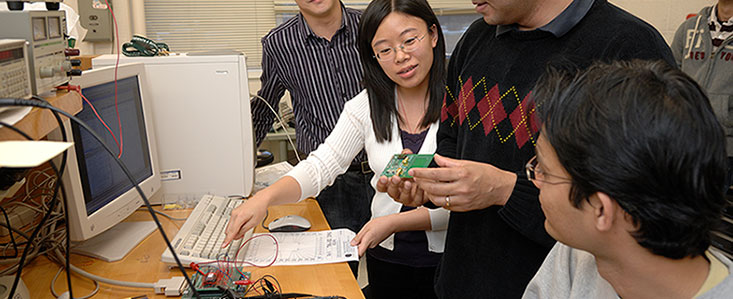With most of its growth taking place over the last 25 years, the CSE Department is a young and research-active department. CSE faculty members are graduates of many of the top departments in the country, and all are currently conducting externally funded research.
The department is home to 20 research laboratories, with annual research expenditures exceeding $8 million.
Research areas of particular strength are:
- AI
- Biometrics
- Image processing
- Machine learning
- Software engineering
- Formal methods
- Mobile computing
- Distributed systems
- Computer networking
- Multimedia technologies
- Natural language processing
- Data mining
- Genetic algorithms
Funding sources include a broad spectrum of federal agencies (including NSF, DARPA, ONR, DOE, NIH, AFOSR, NASA, NSA), Michigan government agencies, and numerous corporate sponsors.
The faculty are aided in this research by an outstanding group of graduate and undergraduate research assistants. The number of faculty in the Department continues to grow, enabling us to strengthen existing research areas and expand into new ones.
Our collective research activities address a number of problems that are important to the nation's security and quality of life. Researchers protect critical infrastructures from cyber-terrorism, enhance how we find and organize information in databases, use biometrics to enhance security systems, explore the human genome, and design software used in safety-critical systems.
Research Groups and Labs
As part of the MSU tradition, our graduate research program emphasizes interdisciplinary collaboration and scholarship that transcends the traditional boundaries of the field. CSE is composed of more than 150 M.S. and Ph.D. students from around the globe.
Our annual research poster workshop gives CSE graduate students an opportunity to display their research and receive recognition for their efforts. It also informs the CSE community about the research our students are conducting and has been a significant community-building activity for more than a decade.
The annual CSE Research Open House provides an opportunity to tour our labs and experience how computer science is transforming the world.
MSU offers a variety of research colloquia, lectures, and seminars related to computer science.
Faculty: Dr. Wolfgang Banzhaf
Faculty: Dr. Huacheng Zeng
The mission of INSS Lab is to advance wireless networking and sensing technologies for the betterment of our society. Currently, the laboratory focuses on the integrated design of hardware (RF circuits and antennas) and software (AI, signal processing, protocols, optimization) to propel innovation in networking and sensing systems.
Faculty: Sijia Liu
Faculty: Dr. Borzoo Bonakdarpour
Faculty: Dr. Anil Jain
The Biometrics Research Group works on problems at the intersection of computer vision and pattern recognition, with a particular focus on face and fingerprint recognition applications
Faculty: Dr. Xiaoming Liu
Develop machine learning/deep learning-based algorithms to understand or extract knowledge from visual data, including image, video, 3D points, LiDAR, Radar, etc.
Faculty: Drs. Betty Cheng, Philip McKinley, Charles Ofria, Pennock, Eric Torng
Faculty: Dr. Josh Siegel
The DeepTech Lab works across disciplines to create applied technology solutions to meaningful and significant problems that would’ve been impossible yesterday, that are barely feasible today, and that tomorrow have the potential to invisibly change the world.
Faculty: Dr. Pang-Ning Tan
The DMiner research lab focuses on the development of novel data mining and machine learning algorithms for various types of data, including spatio-temporal, sequential, and network/graph data.
Faculty: Dr. Emily Dolson
The ECODE lab works at the intersection of computer science, ecology, and evolutionary biology to develop techniques for predicting and controlling the outcome of evolution in a wide range of contexts. By working with vastly different systems that are all controlled by the same principles we are able to develop general-purpose algorithmic advances that span evolutionary computation and biology.
Faculty: Drs. Abdol Esfahanian, Matt Mutka, Eric Torng, Li Xiao, Huacheng Zeng
Faculty: Dr. Vishnu Boddeti
Faculty: Dr. Mohammad Ghassemi
We develops tools and systems that combine human and machine intelligence to solve problems that neither humans nor machines can solve as effectively alone.
Faculty: Dr. Jiayu Zhou
The Intelligent Data Analytics (ILLIDAN) Lab designs scalable machine learning algorithms, creates open source machine-learning software, and develops powerful machine learning for applications in health informatics, big traffic analytics, and other scientific areas.
Faculty: Dr. Arun Ross
We conduct research on the topic of biometrics, privacy, machine learning and computer vision.
Faculty: Dr. Kevin Liu
Our lab creates new computational methodologies for efficient and accurate comparative genomic analyses – especially in the context of complex evolutionary scenarios – and then connects the resulting insights to phenotype and function; the end goal of our big-data-driven approach is to generate hypotheses that result in new biological and biomedical discoveries.
Faculty: Dr. Charles Owen
Faculty: Dr. Qiben Yan
SEIT Lab develops and integrates Secure and Intelligent Things in human lives to enrich living experience and foster creative connections for a better world.
Faculty: Dr. Guan-Hua Tu
The SNMS research group conducts advanced research in the broad areas of security, IoT, mobile systems, and wireless networking, with a recent focus on innovating 5G/4G mobile network architecture/protocol/technologies, cellular/Wi-Fi IoT, secure cloud computing/services, blockchain technologies.
Faculty: Drs. Betty Cheng, Laura Dillon, Sandeep Kulkarni, Philip McKinley


